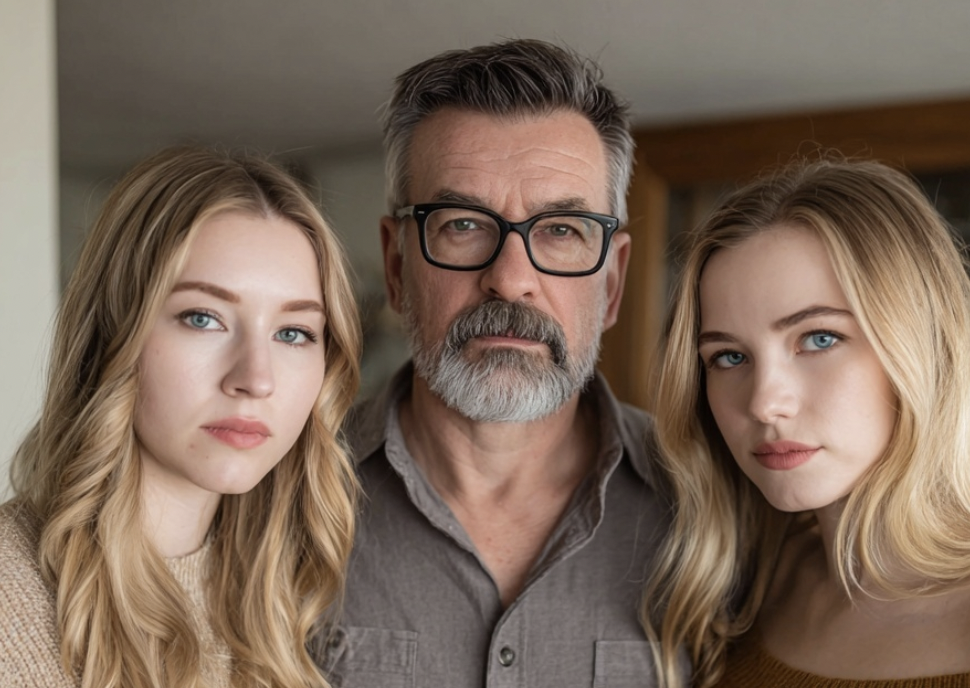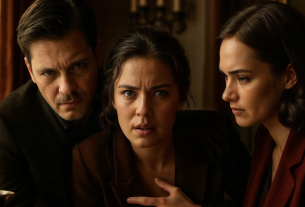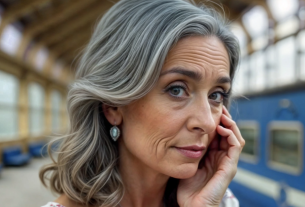Raisa Mikhailovna said it as calmly as if she were commenting on the weather. She sat on the balcony of her city apartment, sipping tea from her favorite rose-patterned mug, and didn’t even glance at her son.
Artyom froze, holding his cup. He had come to visit his mother in the city, as he always did on Saturdays—brought groceries, fixed the leaky kitchen faucet. And now this.
— “What about me?” — was all he managed to utter.
Raisa Mikhailovna shrugged and finally looked at him.
— “You’re a man. You’ll manage. Polina and Irina are girls. It’s harder for them. The apartment, the dacha, the bonds—they’re all going to them.”
— “Mom, but the village house was renovated with my money…”
— “It’s registered to me. So I decide,” she cut him off. “And anyway, that’s enough. You’ve already gotten plenty from life.”
Artyom set his cup on the table. His hands were shaking. Forty-two years old, and he still felt like a guilty little boy in front of his mother.
But something inside him shifted for good.
Thirty-two years ago, Artyom’s father died on a construction site. Raisa Mikhailovna, a paramedic at the local hospital, was left alone with three children. Artyom was ten. Polina and Irina, the twin girls, were only four.
She grieved heavily. Became harsh and bitter. And Artyom, the eldest, got the worst of it.
— “You’re as stubborn as your father! You wear on my nerves!” she would yell when Artyom tried to object or even ask a simple question.
After the funeral, they had to move from the city to their grandmother’s village—money was catastrophically tight. They rented out the city apartment. Artyom quickly became the “man of the house”: taking his sisters to daycare and school, hauling water from the well, stoking the stove, helping with chores. Schoolwork suffered—there was no time, and his mind was always elsewhere.
He remembered sitting with his sisters on winter evenings at the kitchen table, helping with homework. Polina would whine:
— “I don’t want to do math! It’s boring!”
— “You have to, Polinka,” Artyom would patiently explain. “You can’t do without it.”
Irina would quietly cry over her penmanship exercises—she couldn’t get the hooks right. Artyom would take her tiny hand in his and guide it:
— “Look how nice it’s turning out! You’re doing great.”
Raisa Mikhailovna worked double shifts, came home late, exhausted and irritable. No strength left for tenderness.
At sixteen, Artyom finished ninth grade, dropped out of school, and got a job as a loader at the local warehouse. His mother didn’t object—they desperately needed money. Later he worked as a laborer, builder, mechanic. His hands were golden—he could fix anything.
— “Our Artyom is a real jack-of-all-trades,” neighbors would say. “The whole village comes to him with repairs.”
Eventually, things improved. Artyom opened a small shop repairing boat motors. There were plenty of fishermen around, so work was steady. Life got better, but his income still went to support the family.
He bought his mother an electric water heater, installed gas in the village house, paid for his sisters’ university tuition. Polina studied economics, Irina became a translator. Both were smart and beautiful—but acted like Artyom owed them everything.
— “Artyomka, I need a dress for graduation,” Polina would plead, wrapping her arms around his neck. “You won’t say no to your little sister, right? I saw such a pretty blue one with sparkles!”
— “And I need a laptop for school,” Irina added. “I can’t keep using notebooks. Everyone else has laptops.”
And he bought them—dresses, laptops, phones, makeup. The sisters were sweet and grateful when asking. They kissed his cheek, called him the best brother in the world. But the moment he suggested they get part-time jobs, they got offended.
— “Are you getting stingy?” Polina snapped. “We’re students! When are we supposed to work?”
— “So now we have to support ourselves?” Irina chimed in. “Then what’s the point of having a brother?”
And Raisa Mikhailovna always took their side.
— “You’re a man. You’re supposed to help. They have no husbands or homes. They’re vulnerable. What, will you go broke helping your sisters?”
Artyom increasingly felt used. No one saw him as a person—just as a source of money and solutions. But he kept silent. Family is family.
It hurt the most when the girls graduated. Polina got a job at a bank, Irina at a travel agency as a translator. Their salaries were good—but their hands were still outstretched.
— “Artyom, I need a car for work,” Polina announced. “To drive clients around.”
— “And I need money for a training course,” Irina asked. “It’s necessary for work.”
He found out the truth by accident. Aunt Nina, his mother’s sister, let it slip during Raisa Mikhailovna’s birthday dinner:
— “Raisa already registered everything. The village house, the city apartment—all to the girls. She says, ‘Fate already smiled on Artyom.’”
Artyom felt the ground vanish beneath his feet.
— “Fate?” he repeated, trying to stay calm. “I worked in a factory until I could feed myself with my hands!”
Aunt Nina realized she’d said too much. Polina and Irina exchanged glances but said nothing. Raisa Mikhailovna calmly continued slicing the cake.
That same evening, Artyom confronted his mother.
— “Mom, do I get anything at all?” he asked directly.
— “I made my decision,” Raisa replied without looking up from the TV. “It’s not up for discussion.”
— “And the house I renovated? The gas I installed? This apartment I helped pay for?”
— “It’s all in my name. So I decide. Besides, you’re a man—you’ll earn your way. But what about the girls?”
— “Mom, they’re thirty-six! What girls?”
— “They’ll always be my girls,” she snapped.
That’s when something inside Artyom finally broke.
A week later, Artyom packed up and left the house he’d grown up in. He rented a room above his workshop and stopped answering calls from his mother and sisters. He worked day and night to numb the pain.
At first, they called often. Polina was outraged:
— “What’s wrong with you? Mom’s worried!”
Irina cried into the phone:
— “Tyomochka, don’t act like a child. Come over, let’s talk!”
But he didn’t go. For the first time in over thirty years, he lived for himself.
He met Zina a month later. She came to the village to treat a neighbor’s cat—she was a vet from the district center. Simple, kind, with intelligent gray eyes and short light-brown hair. That’s how they met. For the first time in years, Artyom felt like someone was speaking to him as a person—not an ATM.
— “What a cozy place you have,” she said, looking around his modest home. “You can tell a craftsman lives here.”
They started dating. Zina didn’t demand gifts, didn’t complain. She was simply there—listening, understanding, supporting. She cooked simple but delicious meals, told funny stories about her four-legged patients.
— “You’re a good man,” she told him. “Don’t blame yourself for how things turned out. It’s okay.”
They married quietly, with no frills. Only Aunt Nina attended. She brought a folder of documents:
— “I have no children,” she said, hugging Artyom. “I’m leaving you the dacha and my share in the co-op. You’re not just my nephew—you’re like a son. A real son.”
Artyom couldn’t hold back the tears. Someone finally valued him for who he was—not for what he gave.
Raisa Mikhailovna reappeared two years later. By then, the sisters had married and left—Polina to St. Petersburg with her banker husband, Irina to Italy with a man she met at work. Their mother was left alone.
Her pension was small. The gas was shut off for nonpayment. The boiler broke, and there was no one to fix it.
— “I can’t manage,” she complained on the phone. “Help me. I need money for medicine. My blood pressure’s out of control, my heart hurts.”
— “I have my own family now,” Artyom replied calmly. “You gave everything to the ‘girls.’ Let them take care of you now.”
— “They’re busy! Polina’s pregnant in St. Petersburg. Irina’s in another country. They don’t have time for me.”
— “You made your choice, Mom.”
He hung up and never answered her calls again.
Another three years passed. Artyom and Zina lived in Aunt Nina’s house, which they’d renovated together. They had a daughter—Nastenka, who looked just like her mother. Artyom was truly happy.
Every morning he woke up next to the woman he loved, had breakfast with his family, went to work with a light heart. In the evenings he played with his daughter, read her fairy tales, taught her her first words.
— “Papa!” Nastenka babbled, and Artyom’s heart filled with a tenderness he had never known.
Neighbors said Raisa Mikhailovna lived alone, barely making ends meet. The sisters sent holiday cards but rarely visited. Polina called once a month, Irina even less often.
A few times the mother came to Artyom’s door, but he didn’t open it. He saw her through the window—aged, hunched, standing at the gate. His heart ached, but he didn’t go out.
— “Don’t you feel bad?” Zina once asked.
Artyom looked at his sleeping daughter, at his wife, at the cozy home they had built together.
— “No,” he said honestly. “I’m not broken anymore. I’m free.”
And it was true. He now lived for himself and for his family—the one that loved him not for his money, but simply for who he was.
Raisa Mikhailovna got what she wanted—everything went to her daughters. But in the end, she was left with nothing.
And that was her choice. One she would have to live with.



